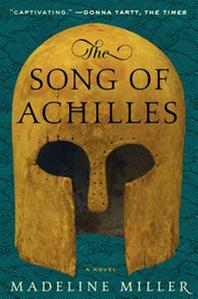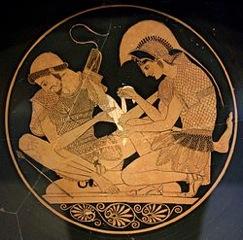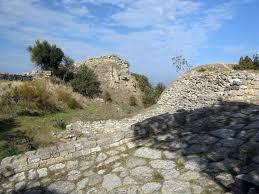The Song of Achilles by Madeline Miller ($24.99, Ecco, 9780062060617, March 6, 2012)
 Homer's epic poem The Iliad, for those who haven't read it for school, is one of the earliest surviving works in Western literature. It describes 10 years of the Trojan War, which carried on until the arrival of the Greek "gift horse" sealed Troy's fate. The Iliad also includes the events leading up to the war--the abduction of Helen, the assembling of an army of kings and princes (Odysseus and Agamemnon among them), and the continual interference of the gods in the affairs of mankind. Several themes are underlined in The Iliad, among them fate, honor, wrath and that most Greek combination of pride and arrogance, hubris. But one thing The Iliad is never billed as is a love story. Until now.
Homer's epic poem The Iliad, for those who haven't read it for school, is one of the earliest surviving works in Western literature. It describes 10 years of the Trojan War, which carried on until the arrival of the Greek "gift horse" sealed Troy's fate. The Iliad also includes the events leading up to the war--the abduction of Helen, the assembling of an army of kings and princes (Odysseus and Agamemnon among them), and the continual interference of the gods in the affairs of mankind. Several themes are underlined in The Iliad, among them fate, honor, wrath and that most Greek combination of pride and arrogance, hubris. But one thing The Iliad is never billed as is a love story. Until now.
Debut author Madeline Miller has discovered and beautifully rendered the love story at the heart of The Iliad between its key figure, Achilles, and his companion Patroclus, who has more of a supporting role in Homer's epic. Miller builds a brilliant novel around this surprising tale, combining the best elements of ancient and modern storytelling. One needn't have faked one's way through the original text or studied Classics to fully appreciate not only this novel, but its source material.
Miller wisely chooses the little-known Patroclus as her narrator, creating a fascinating and complex character that won't clash with any preexisting iterations. "My father was a king and the son of kings," Patroclus declares, but his size and lack of athletic ability soon make him a disappointment to his father. As a youth, he is sent to make a bid for Helen's hand, along with a cadre of princes. Odysseus calls upon the group of suitors to allow Helen to choose her own husband and to swear that they will defend that husband against usurpers. Helen chooses Menelaus, but young Patroclus quickly forgets his oath. Soon afterward, he accidentally causes the death of a another boy and is stripped of his title and exiled to tiny Phthia to be fostered by Peleus, father of Achilles.
 Patroclus is taken with Achilles from their first meeting--"I gaped at the cold shock of his beauty"--if not overly impressed with his manners. But the boys quickly become friends and Achilles takes Patroclus as his therapon (a favored companion). Achilles' destiny as a great warrior soon becomes evident, as do the deeper feelings developing between the two. But there are dark clouds hanging over this nascent romance. One is the prophecy that Achilles will die in battle. The other is Achilles' mother, the immortal and embittered sea-nymph Thetis, who not only disapproves of the relationship but uses her considerable power to keep them apart. Part of the joy of Miller's novel is in her portrayals and elevation of the female characters in The Iliad. Her Thetis is a furious, difficult, mostly absent mother. Yet the maternal love and pride she feels for Achilles is never in doubt. To keep him away from Patroclus, she sends Achilles to be educated by the centaur Chiron. But Patroclus follows and, removed from Thetis' gaze, the two fall deeply and irrevocably in love.
Patroclus is taken with Achilles from their first meeting--"I gaped at the cold shock of his beauty"--if not overly impressed with his manners. But the boys quickly become friends and Achilles takes Patroclus as his therapon (a favored companion). Achilles' destiny as a great warrior soon becomes evident, as do the deeper feelings developing between the two. But there are dark clouds hanging over this nascent romance. One is the prophecy that Achilles will die in battle. The other is Achilles' mother, the immortal and embittered sea-nymph Thetis, who not only disapproves of the relationship but uses her considerable power to keep them apart. Part of the joy of Miller's novel is in her portrayals and elevation of the female characters in The Iliad. Her Thetis is a furious, difficult, mostly absent mother. Yet the maternal love and pride she feels for Achilles is never in doubt. To keep him away from Patroclus, she sends Achilles to be educated by the centaur Chiron. But Patroclus follows and, removed from Thetis' gaze, the two fall deeply and irrevocably in love.
But prophecies by their nature are inexorable and the time comes when both Achilles and Patroclus must go to war and defend the honor of Menelaus after Helen is abducted by the Trojan, Paris.
 The slow, sunlit pace of the novel undergoes a rapid shift once the scene moves to Troy. Miller's battle scenes combine thrilling action and subtle shifts in mood without sacrificing any detail, demonstrating the sure hand of a writer who knows her territory well. And it is here that she captures her readers most completely, tying the intimate story of Achilles and Patroclus to larger, resonant themes of honor, friendship and self-determination. Her lens is panoramic, her battlefield wide and bloody; yet she conveys every aspect of it in high relief, down to the glints in Achilles' armor. It is a testament to Miller's prodigious talent that all of her scenes--whether they describe the chaos of war or the secrets whispered between lovers--are equally powerful and nuanced. And as familiar as they are to us, Miller makes her characters fresh, real and undeniably human, despite their mythological attributes. Achilles is an intriguing, complicated character; at once loving, kind, arrogant and ruinously stubborn. His anger and intractability are what inadvertently cause the death of the person he loves above all else and what tips the scales toward the destiny he has been trying to outrun. But it is Patroclus readers will most relate to. An outsider and exile with none of Achilles' godly attributes, he is nonetheless a hero; an ordinary man in extraordinary circumstances.
The slow, sunlit pace of the novel undergoes a rapid shift once the scene moves to Troy. Miller's battle scenes combine thrilling action and subtle shifts in mood without sacrificing any detail, demonstrating the sure hand of a writer who knows her territory well. And it is here that she captures her readers most completely, tying the intimate story of Achilles and Patroclus to larger, resonant themes of honor, friendship and self-determination. Her lens is panoramic, her battlefield wide and bloody; yet she conveys every aspect of it in high relief, down to the glints in Achilles' armor. It is a testament to Miller's prodigious talent that all of her scenes--whether they describe the chaos of war or the secrets whispered between lovers--are equally powerful and nuanced. And as familiar as they are to us, Miller makes her characters fresh, real and undeniably human, despite their mythological attributes. Achilles is an intriguing, complicated character; at once loving, kind, arrogant and ruinously stubborn. His anger and intractability are what inadvertently cause the death of the person he loves above all else and what tips the scales toward the destiny he has been trying to outrun. But it is Patroclus readers will most relate to. An outsider and exile with none of Achilles' godly attributes, he is nonetheless a hero; an ordinary man in extraordinary circumstances.
It is no small task to take on The Iliad, never mind the myths on which it is based, and come out so far ahead. With this dazzling jewel of a novel, Madeline Miller has proven more than worthy of the challenge. There is only one caveat; the final pages may cause the welling of sudden and heartfelt tears. --Debra Ginsberg

